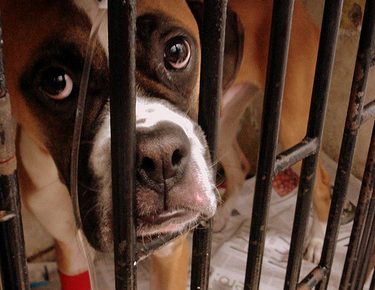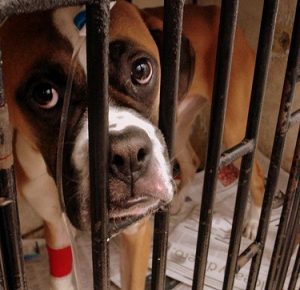
Heart disease in dogs can be caused by genetic defects (sub-aortic stenosis, mitral valve defects, septal defects etc.) or by heartworm infection, cardiomyopathy – enlargement of the heart – and poor nutrition (lack of certain nutrients). Older dogs are most likely to be affected by heart disease. If your dog has problems with the spleen or has had a splenectomy, heart problems can develop. Most heart problems in dogs lead to congestive heart failure rather than heart attacks. This is a condition where symptoms appear slowly and worsen with time.
The dog’s heart is the same as in all mammals – 4 chambers and left and right atrium and left and right ventricle. If your dog shows signs that include poor appetite, coughing, fainting, difficulty breathing, enlarged abdomen or gums that are pale with a bluish tinge, have your veterinarian check for heart disease. There are drugs available today to treat heart problems, but don’t delay if you suspect illness in your dog. Following is a list of some of the dogs that are prone to different types of heart problems – Dogue de Bordeaux, Golden Retriever, Bouvier des Flandres, American Water Spaniel, Sussex Spaniel, Borzoi, Irish Wolfhound, Saluki, Scottish Deerhound, Boxer, Great Dane, Neopolitan Mastiff, Newfoundland, Rottweiler, Saint Bernard, Bull Terrier, Manchester Terrier, Cavalier King Charles Spaniel, Chihuahua, Toy Manchester Terrier, Miniature Pinscher, Border Collie. This does not mean that these breeds will have heart disease. It only indicates that a problem may exist.
When your dog goes to the vet, have the heart checked as part of the routine.
Contents |
Symptoms
Some signs that your dog may be suffering from heart disease:
- Lack of energy
- Fatigue, increased sleeping time
- Panting and puffing, labored or rapid breathing
- A dry cough, especially in early morning or at night
- Loss of appetite
- Weight loss or gain
- Less playful, signs of depression
- Weakness, fainting or collapsing
- Swelling in limbs, bloated abdomen
- Restlessness especially at night
- Stays away from other pets and/or you
Types of heart disease
Congestive Heart Failure – this is usually the result of different heart problems. In this case the heart is unable to be an effective pump resulting in an enlarged heart and pooling blood in the lungs and organs. Symptoms of congestive heart failure can be lack of desire to exercise, difficulty breathing and excessive panting during normal activity, coughing, unexplained weight loss.
Atrial Septal Defects – There is a hole in the wall of the heart that separates the right and left atria.
Cardiomyopathy – The heart becomes enlarged due to the heart muscle not functioning properly.
Mitral Valve Insufficiency – The mitral valve of the heart dysfuntions causing blood to flow backward into the left atrium. This results in an enlarged heart.
Pulmonic Stenosis – There is a congenital narrowing of the opening of the heart between the right ventricle and pulmonary artery. This will eventually cause right-sided heart failure.
Subvalvular Aortic Stenosis – There is an abnormal connection between the left ventricle and the aorta. This will lead to heart failure.
Tricuspid Valve Dysplasia – This occurs when one of the heart valves is malformed.
Treatment
Dogs with heart disease are usually treated with drugs that fix irregular heartbeats, increase the amount of blood that the heart pumps with each beat, and reduce the build up of fluid that this condition often causes in the lungs and abdomen. Diet and exercise are also recommended. If necessary, surgery will be performed.
Video



